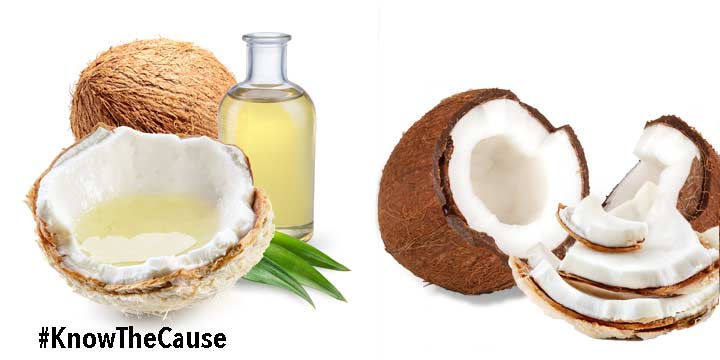

In recent years, MCT Oil has become all the rage for its purported benefits for weight loss, energy, and brain function. But just what is MCT Oil, and why are we just now hearing about it?
From a chemical and molecular standpoint, all fats are composed of chains of carbon atoms. Usually, most dietary fats are composed of between 13 and 21 carbon atoms; these are known as long chain triglycerides. MCT oil, however, is unique in contrast to these long chain triglycerides. MCT oil consists of between 6 to 12 carbon atoms, creating what are called medium chain triglycerides, or MCT oil. This unique chemical composition has implications for the way MCT oil is metabolized and its subsequent health benefits.
MCT oils are found in coconut, palm kernel oil, butter, and milk. MCT oil supplements, however, are partially man-made oils and are typically derived from coconut oil or palm kernel oil. So, MCT oils are not found in nature necessarily by themselves. MCT oils must be extracted or distilled from natural sources. Therefore, any supplemental MCT oil is, in fact, processed oil.
MCT oil is odorless and tasteless and remains a liquid at room temperature. People who use MCT oil add it smoothies, salad dressings and even the ultra-popular Bulletproof coffee recipes. Its smoke point is particularly low, so it is not useful for any sort of cooking or heat application.
How Does MCT Oil Work?
MCT oil is metabolized in a different way from other dietary fats. MCT oil is metabolized goes straight from the gut to the liver where it is immediately metabolized for energy––this means it provides fairly immediate energy, and the calories inherent in MCT oil are less likely to be stored as fat.
The metabolizing of MCT oil into energy creates ketones––a type of molecule that the brain can use for energy in lieu of glucose (blood sugar). For this reason, proponents of the ketogenic diet often champion MCTs. The whole idea behind the ketogenic diet is to metabolize fat for energy, which releases ketones; the metabolism of MCT oil is one example of how this process works.
What Is MCT Oil Used For?
MCT oil has a number of uses recognized by conventional medicine. MCT oils are used in conjunction with other medicines for treating certain diseases, especially diseases that deal with improper food absorption or in patients who have had parts of their digestive tract removed. MCT oils are also used in patients whose entire digestive tract is no longer functioning and must receive nutrition intravenously. They are often given to older people to increase muscle mass and prevent muscle loss in very sick patients.
MCT oil has also been indicated for uses in liver disease, gall bladder diseases, cystic fibrosis, AIDs, Alzheimer’s and seizures in children. MCT oil might have benefits against diabetes and in lowering cholesterol levels.
What Are The Benefits of MCT Oils?
MCT oils have enormous application in a medical context, but their use extends beyond what they are used for in this setting. MCT oils are purported to have a number of benefits for people looking to promote healthily and perform at a higher level.
Better Brain Function
Much of MCT oil’s appeal has come from the bio-hacking community, who claim that MCT oil can boost brain function, memory and mental clarity. Given the way the MCT oil is metabolized––with its rapid release of ketones that can be used by the brain as energy––this would make sense. This is certainly one of MCT oil’s major selling points. MCT oil proponents often claim that it can boost brain function and mental clarity.
There is some evidence that MCT oil might be beneficial for Alzheimer’s, but the verdict is still out and more research needs to be done.
Heightened Energy, Better Endurance
Metabolizing MCT oils provides more immediate energy than metabolizing ordinary dietary fat, which is why many athletes and performers use MCT oil regularly. There has been some research into the claims about MCT oil’s energy boosting properties. Some studies have concluded that MCT oils increased endurance for recreational athletes, but other studies have been inconclusive. Regardless, MCT oil remains a popular supplement among performers and athletes alike, or anyone trying to boost their energy.
Weight Loss
MCT oils are touted heavily on the ketogenic and Bulletproof diets, both of which claim to be beneficial for weight loss. Some studies back up the claim that MCT oils might have some benefit for weight loss. One study concluded that MCT oils actually increased the number of calories burned in overweight people. Another study concluded that MCT oils worked to suppress the hormones responsible for promoting appetite, leading to dieters feeling fuller for longer periods of time.
Cardiovascular Benefits
MCT oils are thought to promote healthy levels of cholesterol, as opposed to other dietary fats. While cholesterol is not the only risk factor in heart disease, it remains an important marker for many conventional physicians, so this benefit should not be overlooked.
Benefits Against Diabetes
Some evidence exists that MCT oils can be beneficial against insulin resistance and improve blood sugar levels; this might make MCT oil an important supplement for those with, or at risk for, Diabetes.
MCT Oils Are Anti-fungal
Particularly, in the cause of caprylic acid, MCT oils might provide enormous anti-fungal benefit. Caprylic acid, again, is something that has been recommended on the Kaufmann Diet for some time now for this particular benefit. While coconut oil in general is beneficial against yeast and fungi, caprylic acid is particularly potent in this regard.
Coconut–Derived MCT Oil
There are a few different MCT oils found within coconut oil. There is caproic acid (C6), which is comprises a very small amount of coconut oil; caprylic acid (C8) of which coconut oil is about 6%; capric acid (C10) which makes up around 9% of coconut; and lauric acid (C12) which makes up around 50% of coconut oil.
Caproic acid (C6) can cause irritation in the bowels and throat, although it does metabolize in the beneficial way MCT oils are valued for. Caprylic acid (C8), however, might be the most beneficial, in terms of proper metabolism and low irritability. (Caprylic acid, again, is something that has been recommended on the Kaufmann Diet for years as a potent anti-fungal supplement and can be an important part of an Anti-fungal supplement regimen.)
Lauric acid (C12) is often touted as an MCT oil, and while it still does have some benefits, lauric acid does not metabolize in the same way as the shorter chain fatty acids do and does not necessarily confer the same benefits.
MCT Oil And The Kaufmann Diet
On the Kaufmann Diet, coconut oils are encouraged; coconut oil is rich in a number of fats that have antimicrobial––particularly anti-fungal––properties. Coconut oil seems to be particularly good at eliminating fungi; largely, MCT oil is a coconut oil derivative. It possesses the same Anti-fungal properties, and when it is the right MCT oil (caprylic acid), those effects may even be compounded. While all coconut oils contain MCT oils, getting the abundance of the beneficial MCT oils likely requires supplementing with an MCT oil supplement.
Try adding MCT oil to salad dressings. It can also be added into Kaufmann Diet-friendly smoothies. It is odorless and tasteless and can be taken on it’s own as well. If you have graduated to Kaufmann 2, you can try the Bulletproof coffee recipe, which consists of Bulletproof coffee (which claims to have a process for preventing or eliminating mycotoxins in their coffee beans), grass-fed butter (such as Kerrygold Irish butter) and MCT oil. This coffee recipe is touted by many performers and athletes as a performance and brain enhancer.
It is perfectly fine to use both MCT oil and coconut oil on the Kaufmann Diet. However, always consult your physician before begging a supplement regimen or changing your diet.
Doug Kaufmann has written many books that cover a full range or health issues. Find out which of his books best suits you by clicking the button below.
Doug Kaufmann developed his diet after years studying the clinical effects of pathogenic fungi on the body. Fungi and yeasts can become parasitic organisms on and inside our body, causing health problems that can be difficult to diagnose. Learn more about the Kaufmann Diet, change your life and know the cause.
We encourage all visitors to this site to take some time and study these technical articles prior to initiating lifestyle changes, including dietary changes and to do so with their physician’s awareness and approval. The articles posted in this link are scientific and with few exceptions are taken from medical journals familiar to healthcare workers.
Looking for help assembling antifungal Kaufmann Diet approved recipes for breakfast, lunch or dinner? We have several videos, books and recipe write ups here on Know the Cause that will help your health journey. The recipes in this section are so good, you’ll feel like you’re indulging. No sacrifice needed! Enjoy.
© 2024 Mediatriton Inc. All Rights Reserved • Website by Skynet Solutions